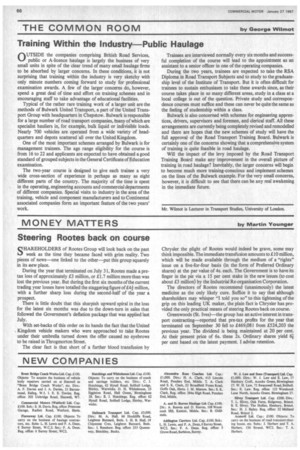Training Within the Industry—Public Haulage
Page 68

If you've noticed an error in this article please click here to report it so we can fix it.
OUTSIDE the companies comprising British Road Services, public or A-licence haulage is largely the business of very small units in spite of the clear trend of many small haulage firms to be absorbed by larger concerns. In these conditions, it is not surprising that training within the industry is very sketchy with only minute numbers coming forward to study for professional examination awards. A few of the larger concerns do, however, spend a great deal of time and effort on training schemes and in encouraging staff to take advantage of educational facilities.
Typical of the rather rare training work of a larger unit are the methods of Bulwark United Transport, a part of the United Transport Group with headquarters in Chepstow. Bulwark is responsible for a large number of road transport companies, Many of which are specialist hauliers in, for example, bulk liquid or indivisible loads. Nearly 700 vehicles are operated from a wide variety of headquarters and depots scattered all over the United Kingdom.
One of the most important schemes arranged by Bulwark is for management trainees. The age range eligibility for the course is from 16 to 22 and applicants are expected to have obtained a good standard of grouped subjects in the General Certificate of Education examination.
The two-year course is designed to give each trainee a very wide cross-section of experience in perhaps as many as eight different parts of the country. The majority of the time is spent in the operating, engineering accounts and commercial departments of different companies. Special visits to industry in the area of the training, vehicle and component manufacturers and to Continental associated companies form an important feature of the two years' work. Trainees are interviewed normally every six months and successful completion of the course will lead to the appointment as an assistant to a senior officer in one of the operating companies.
During the two years, trainees are expected to take the RSA Diploma in Road Transport Subjects and to study to the graduateship level of the Institute of Transport. But it is often difficult for trainees to sustain enthusiasm to take these awards since, as their course takes place in so many different areas, study in a class at a local college is out of the question. Private study and correspondence courses must suffice and these can never be quite the same as the feeling of studentship within a class.
Bulwark is also concerned with schemes for engineering apprentices, drivers, supervisors and foremen, and clerical staff. All these arrangements are currently being completely revised and remodelled and there are hopes that the new schemes of study will have the full approval of the Road Transport Training Board. Bulwark is certainly one of the concerns showing that a comprehensive system of training is quite feasible in road haulage.
Will the impact of the levy imposed by the Road Transport Training Board make any improvement in the overall picture of training in. road haulage? Inevitably, the larger concerns will begin to become much more training-conscious and implement schemes on the lines of the Bulwark example. For the very small concerns, however, it is difficult to see that there can be any real awakening in the immediate future.












































































































